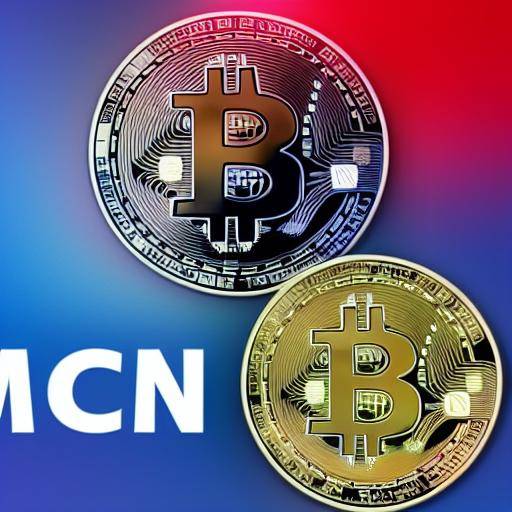
Introduction
In the digital era, the concept of decentralization has gained significant relevance in the transformation of the financial system. Criptocurrencies, with their innovative underlying technology, have played a key role in creating a decentralized financial system. This article explores the history, impact, and future of cryptocurrencies in the decentralization of the financial system, offering an integral vision of how these innovations are redefining the global economic landscape.
History and Background
Criptocurrencies, although they have recently gained popularity, have origins dating back over a decade. In 2009, Satoshi Nakamoto presented Bitcoin, the first decentralized cryptocurrency. Since then, these digital currencies have evolved, challenging traditional financial structures.
Criptocurrencies emerged as a response to deficiencies in the conventional financial system, offering autonomy, transparency and security without intermediary intervention. With the advent of blockchain, the distributed accounting technology that supports cryptocurrencies, paved the way for a truly decentralized and innovative financial system.
Deep analysis
Criptocurrencies have proven to be a source of disruptive innovation in the financial world. By removing geographical barriers and regulatory restrictions, they have revolutionized the way transactions are made and value is stored. However, this advance is not without challenges, such as market volatility and cybersecurity risks.
The impact of cryptocurrencies has spread beyond financial transactions. They have promoted the creation of new business models and encouraged the adoption of technologies such as smart contracts and decentralized finance (DeFi). Despite initial uncertainties, cryptocurrencies are gaining acceptance in conventional financial circles and are being regarded as a legitimate asset class.
Comprehensive review
Cryptocurrencies have found diverse applications, from cross-border payments to asset tokenization. Its influence extends to industries such as banking, health and entertainment, offering innovative and efficient solutions to persistent problems. With the growing adoption of cryptocurrencies, decentralization promises to promote financial inclusion, especially in regions with underutilized financial systems.
Despite their benefits, cryptocurrencies also pose regulatory and security challenges, resulting in discussions on their long-term viability. However, their ability to transform the global economy is undeniable, raising questions about how they will be integrated with existing financial systems.
Comparative analysis
Decentralization, innovation and the future are intrinsically linked in the context of cryptocurrencies. While decentralization challenges the concentration of financial power, innovation drives the development of new technologies to facilitate safe and efficient transactions. These elements converge in the vision of a more inclusive and equitable financial future.
This decentralized approach has raised questions about interoperability and coexistence with centralized financial systems. As cryptocurrencies continue to evolve, their ability to complement or replace existing financial structures remains under discussion.
Practical Tips and Accessible Recommendations
If you are considering engaging in the ecosystem of cryptocurrencies, it is essential to understand the principles of security, diversification and continuing education. The inherent volatility of cryptocurrencies requires careful risk management and a sound understanding of the underlying foundations. Diversifying investments and keeping informed about market trends are key practices for sailing around the world of effective cryptocurrencies.
Industry Perspectives and Expert Reviews
Financial industry experts have expressed diverse views on the impact of cryptocurrencies on the decentralization of the financial system. Some consider that cryptocurrencies represent a radical change in the way financial transactions are conceived, while others warn about the risks associated with lack of regulation and market volatility. However, the overall trend is towards greater integration of cryptocurrencies into the global financial landscape.
Case Studies and Real Life Applications
Case studies offer a practical view of how cryptocurrencies are being implemented in various scenarios. From the tokenization of real estate assets to cross-border remittance programmes, cryptocurrencies are demonstrating their usefulness in real-world environments. These use cases illustrate how decentralization and innovation are transforming traditional financial processes, opening new opportunities for inclusion and efficiency.
Future Trends and Predictions
As cryptocurrencies continue to evolve, future trends are visible that will shape the financial landscape. Regulation and institutional adoption are expected to increase, which could boost stability and confidence in cryptocurrencies. The emergence of emerging technologies, such as asset tokenization and quantum computing, also promises to redefine the future of cryptocurrencies and decentralization.
Conclusions and FAQs
In short, cryptocurrencies are playing a key role in building a decentralized and innovative financial system. Its impact extends far beyond digital transactions, opening up new possibilities of financial inclusion and economic efficiency. As technology continues to mature, the role of cryptocurrencies in the future of the financial system remains a source of debate and interest.
Frequently asked questions
1. How does decentralization relate to cryptocurrencies?
Decentralization in the context of cryptocurrencies refers to the elimination of intermediaries and the transfer of power to the distributed network of users, which guarantees greater transparency and autonomy in transactions.
2. What are the challenges associated with the massive adoption of cryptocurrencies?
Challenges include market volatility, cybersecurity, lack of clear regulation and interoperability with traditional financial systems.
3. How will cryptocurrencies affect conventional financial institutions?
Criptocurrencies are challenging the status quo by offering decentralized alternatives to financial institutions, which could motivate them to innovate and adapt to compete in the new digital environment.
4. What is the perspective of cryptocurrencies in emerging economies?
Criptocurrencies offer significant opportunities for financial inclusion in emerging economies by providing access to financial services without the need for traditional banking infrastructure.
5. What is the role of innovation in the development of cryptocurrencies?
Innovation drives the constant evolution of cryptocurrencies, facilitating the development of new functionalities, applications and solutions as technology advances.
6. How can individuals protect themselves by investing in cryptocurrencies?
Due diligence, portfolio diversification, the use of safe wallets and financial education are critical to protecting themselves by investing in cryptocurrencies.
This article has thoroughly explored the changing role of cryptocurrencies in the creation of a decentralized financial system. From its inception to future trends, cryptocurrencies continue to evolve and play a significant role in decentralization and financial innovation.






















































